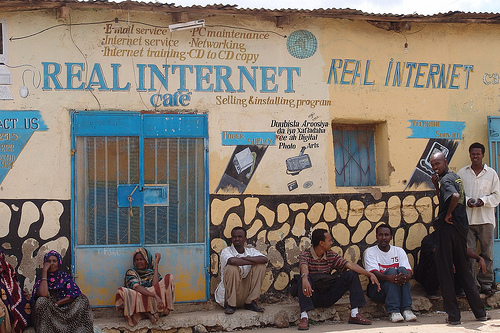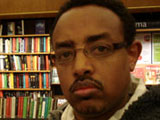Digitized Struggle
by Mesfin Negash / June 15, 2012 / No comments
Competition between activists and autocrats on the Net.

Internet cafe in Jigjiga, Ethiopia. Photo: Flickr user CharlesFred, Creative Commons licensed
Among the lessons the Arab Spring has brought is the potential of technology to promote freedom, democracy, and the power of the masses. Since the protests, donors and pro-democracy groups have been increasing their commitment, at least rhetorically, to support internet freedom and activism.

- Why does a country with her own unique alphabet and long history of writing persist to deny citizens the right to freedom of expression in this era of Expression? No other country in Africa may typify this paradox more than Ethiopia. As Leopold Senghor’s famous collection of poems entitled “Ethiopiques” remained ‘powerful and popula’ so does the source of his intriguing title, Ethiopia, in her own ways. In “Ethiopiques,” I share Ethiopian views on pertinent issues related to journalism, culture and, of course, the overarching subject of politics.

- Mesfin Negash is an Ethiopian journalist living in exile in Sweden. He is one of the journalists accused of “terrorism” in 2011 by the Ethiopian government. The co-founder and first editor-in-chief of an acclaimed Ethiopian newspaper, Addis Neger, he is currently the Managing Editor of Addisnegeronline.com. He is a political science student by training and known for his critical commentaries on significant political and social issues.
Technology’s power is in gathering, disseminating, and sharing information. During the Arab Spring we saw it mobilize support and influence the public’s agenda. But despite innovative uses of technology to further the cause of freedom, regimes such as China and Iran have mastered the repressive power of the same technology. The competition between these two uses will ultimately influence the inevitable struggle between the rulers and their subjects.
Take a look at Ethiopia to witness an increasing number of people joining internet platforms to share political views, despite the intensity of internet censorship in the country. No other platform in Ethiopia has been as open and inclusive as the online space, which is relatively easy to use and access, is more private than traditional media, and directly links the local population to the Diaspora. However, it has two fundamental limitations to be an indispensable public platform: Low penetration and censorship.
According to the Internet World Stats, the internet penetration rate in Ethiopia stands at 0.7% of the population, one of the least in the world. In terms of online censorship, the country is reportedly getting effective aid from China. More than 150 websites, including blog pages and Facebook pages, are blocked in Ethiopia, and the filtering sometimes includes online versions of newspapers published within the country. The parliament, which has only one opposition member out of 547, passed a law “criminalizing the use of Internet-based voice communications such as Skype and other forms of Internet phone calling.” A few weeks ago, it was reported that Ethiopia started testing Deep Packet Inspection (DPI), surveillance software previously employed in China, Iran, and Kazakhstan. There are also paid bloggers working online to suffocate and disrupt the already narrowed space.
Even with the lessons gained from the Arab Spring, pro-democracy activists in countries like Ethiopia will face challenges if they use technology as an instrument of struggle. It takes an understanding of the technology and security issues, discipline, and most importantly, knowledge of what to do with the platform to make it effective. Unlike Tunisian and Egyptian net-activists, in Ethiopia there is very little evidence to link cyber activity with activity on the ground. In Ethiopia very few lesser-known, poorly organised, and poorly financed activists are daring to fight a dictator who brags about his repressive capacity.
The good news is that technology is open for endless creativity, and the social dynamic of society is not static. As Larry Diamond once wrote, “Democrats and autocrats now compete to master these technologies. Ultimately, however, not just technology but political organization and strategy and deep-rooted normative, social, and economic forces will determine who ‘wins’ the race.”




